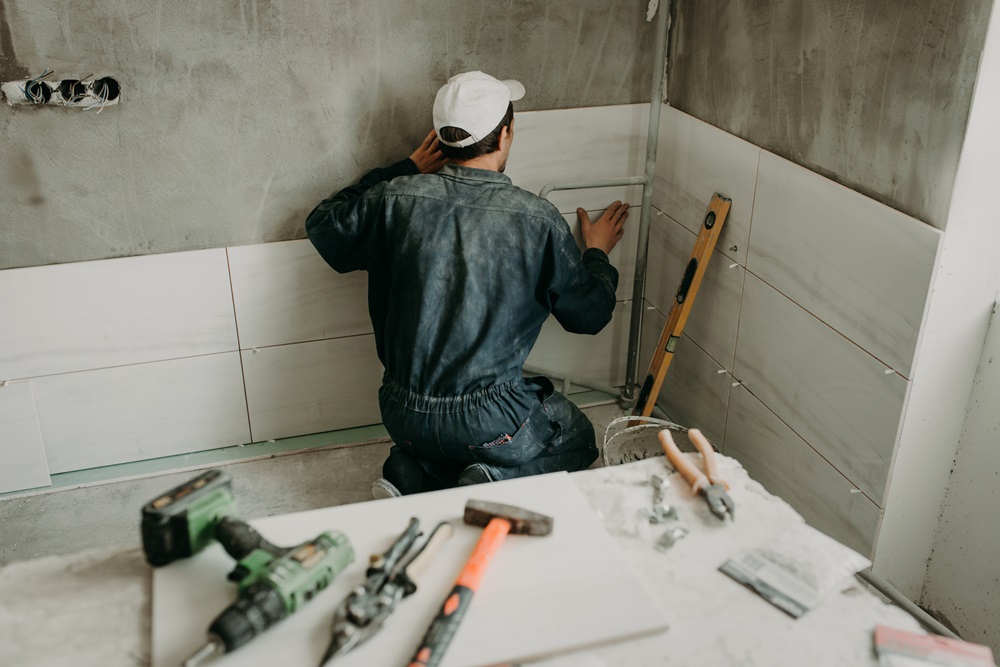Walking into your bathroom only to find a mess of mismatched tiles, leaking faucets, and mounting expenses are some renovation nightmares that are a harsh reality for homeowners who don’t carefully choose their contractor. A bad hire can leave you with half-finished work, financial headaches, and a pile of stress. You don’t have to fall victim to this scenario! Protect yourself by asking the right questions before signing a contract.
Asking these key questions lets you gain the information you need to find the right fit for your bathroom remodeling project.
Can you demonstrate your experience and expertise in bathroom remodeling?
Your guide to bathroom remodeling begins with finding the right contractor. It’s a big decision. You’d want to ensure you’re hiring someone with the skills and experience to handle the specific challenges of this type of project. Here are some questions to ask:
- How long have you specifically focused on bathroom renovations? A contractor with years of experience in bathroom remodels is more likely to handle plumbing, electrical, and space constraints well.
- Would you be able to share your portfolio of completed bathroom projects? A portfolio allows you to see the quality of a contractor’s work, their style, and the variety of projects they’ve handled.
- Do you have any areas of specialization within bathroom design? Some contractors may specialize in modern designs, spa-like bathrooms, or accessible bathroom remodels.
Asking these questions helps you assess a contractor’s background and ensure it aligns with your project’s needs. A seasoned contractor with a proven track record in the type of bathroom you want puts you one step closer to a successful renovation.
Do you have the proper licensing and insurance?
Hiring a licensed and insured contractor isn’t just a good idea – it’s vital. Licensing ensures the contractor has met the necessary education and experience requirements to work in your area. Insurance protects both you and the contractor in case of accidents or property damage.
- Can you confirm you possess all state/county-mandated licenses? Ask contractors to provide their license number so you can verify their status with your local licensing authority.
- Can you provide documentation showing your liability and worker’s compensation insurance? Don’t just take their word for it! Request proof of insurance to ensure they have the proper coverage.
Working with an unlicensed or uninsured contractor carries major risks. You could be liable for injuries that occur on your property. Also, shoddy work by an unlicensed contractor may not meet building codes and might need to be redone.
Choosing a contractor with the right credentials gives you peace of mind. It also shows they take their business and your project seriously.
Can you provide a comprehensive cost breakdown and explain your contract terms?
Understanding the project’s cost and the terms of your agreement is crucial for avoiding financial surprises. A clear roadmap ensures everyone is on the same page. Here’s what you need to ask:
- Would you please provide a detailed written estimate outlining material, labor, and permit costs? A thorough estimate breaks down expenses by category and helps you compare quotes from multiple contractors.
- What are the payment terms outlined in your standard contract? It’s common for contractors to ask for a deposit upfront, with progress payments due throughout the project. Understand these terms before signing.
- How do you approach change orders that might arise during the project? Even with careful planning, change orders (modifications to the original plan) can happen. A good contract outlines how these will be handled, including what triggers a change order and how additional costs or timeline adjustments will be determined.
Don’t be afraid to request clarification or negotiate terms that make you uncomfortable. A reputable contractor will be transparent, explaining the estimate and contract in detail.

What is the anticipated project timeline and how will you manage disruptions?
A bathroom remodel can temporarily throw your life into disarray. Understanding the estimated timeline and how your contractor plans to minimize disruptions can help you prepare.
- What’s your realistic estimate for the project’s start-to-finish timeframe? Get a clear picture of how long the remodel will take. Consider factors like project complexity and the availability of materials.
- How do you plan to minimize the impact on my household’s routine? Will the contractor take steps to isolate the work area? Can they set up a temporary bathroom solution? Discuss these logistics.
- What is your strategy for addressing unexpected delays? Delays can happen due to factors like weather or material backorders. Ask how the contractor handles these situations and communicates updates.
A realistic timeline and plan for minimizing disruptions show the contractor respects your time and living space. It demonstrates their commitment to ensuring the process goes as smoothly as possible for you.
Conclusion
Choosing the right contractor is vital for bringing your dream bathroom to life. Asking these essential questions upfront empowers you to make the best decision possible for your home and budget.
Additionally, you’d want to get bids from at least three different contractors so you can compare pricing and approaches. And do listen to your gut feeling. If a contractor makes you feel uneasy, even with the right credentials, they may not be the best fit. Look for a partner who genuinely listens to you, respects your home, and inspires confidence in their abilities.
With careful planning and by choosing the right contractor, you can transform your bathroom into the relaxing, beautiful space you deserve. Don’t settle for anything less!

Recent Comments